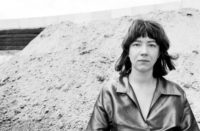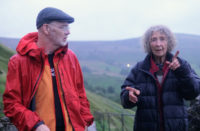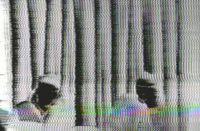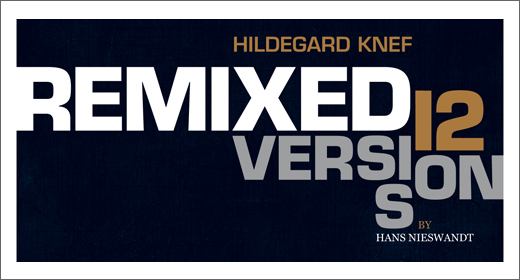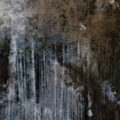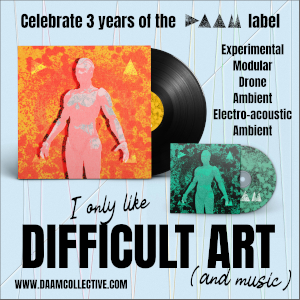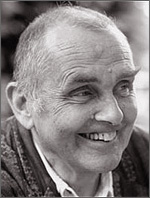
(05.14.07) THE legendary Hans-Joachim Roedelius needs little introduction for those familiar with the history of electronic music. From his early work with Kluster/Cluster to his collaborations with Brian Eno,
Roedelius has shown no signs of slowing his innovation. We caught up with the master to pick his brain about life, the universe, and everything following the release of his most recent opus, Snapshots/Sidesteps, out now on Psychonavigation Records. Highly recommended, this release contains intense blasts of oft-spontaneous collaborations with many artists inspired by Roedelius – many of which were recorded countries apart from each other.
::..:::…..:..::….:::::..:::..:::::::……:::…::.:::….::::..:..:::…::…….:::::
Igloo :: The music on your most recent release, Snapshots/Sidesteps, spans over 10 years. Was this a long-time plan, or is this a
collection of various collaborations that you are most proud of?
Hans-Joachim Roedelius :: It’s as it says – a sidestep, not planned at all, it just happened like all what I’m doing happens somehow, accidentally, when time allows, when I’m in the right mood, when I like to do it.
Igloo :: Were there any particularly memorable collaborative sessions from the album that you’d like to share?
HJR :: There were only real sessions with Werner Moebius, this track is an excerpt of a live performance in one of the most beautiful places
in Lower Austria where I live, another was with Alex (The Orb) Paterson along with Thomas Fehlmann in Thomas studio in Berlin and with Fabio Capanni in my little studio in Austria. All the other tracks are modified materials made from original tracks of the mentioned composers.
Igloo :: Which party (yourself or the collaborating artists) normally set up the chance to record together?
HJR: Depending on the project of course, but as I’m mentioning in the beginning, the chance happens mostly by chance.
Igloo :: Describe the future of Roedelius, and what we can expect sonically.
HJR :: The future is now and I don’t know what you have to expect other as what I’m doing now. I myself expect that I’m doing serious work with the same great joy as ever over all the time that’s left for me at my age.
Igloo :: Are there any thematic motives that underly the flow of this album? That is, are you trying to relate a particular theme through every song, or even through several?
HJR :: Just take it like it is – if you have fun with it, take it like that.
Igloo :: Working with artists that have been undoubtedly influenced by your previous work, did you find yourself inspired by the feedback received from your collaborators?
HJR :: Of course; it’s very nice to be that well respected.
Igloo :: The music throughout the album spans a wide variety of electronic styles. Did you find this experience rewarding, and was it a challenge to make your own unique music within such varied genres?
HJR :: Don’t forget – music expresses itself. I don’t think I did much on those tracks, I just took care of the material and the spirit of the material!
Igloo :: How do you feel about the term “krautrock” and its use as a catch-all term for German “psychedelia” in the 1960s and 70s? Is the term “kosmische” more widely used, or even acceptable?
HJR :: I know that people like categories. If they put me in whichever, it’s okay for me.
Igloo :: Could you discuss how the Brian Eno collaborations came to fruition, and the results?
HJR :: It was a lucky momentum in all of the participating artists / friend’s lives / careers!
Igloo :: With the upcoming release of one of the Human Being recordings from 1968, could you tell us more about your time with the Zodiak-Artslab?
HJR :: This was for me the release from something I never did appreciate as much before, as much as I appreciated what opened itself to me as a result.
Igloo :: With the mixed political situation in Germany at the time, how did this affect the music and arts scene in the area? Was there ever any communication with like-minded artists in the East?
HJR :: Anything that happens influences everything – of course was there a great discourse throughout Germany at the time.
Igloo :: Do you have any particular favorite bands or musicians from the era of Cluster, and what are you listening to now?
HJR :: I still like Can, Third Ear, Capt. Beefheart, Frank Zappa, Jimi Hendrix, The Band, Crosby, Stills&Nash and Young, Joni Mitchell (what a beautiful voice) and many, many others, such as Edith Piaf, Eric Satie, Judy Garland, Jaques Brel etc. Today’s pop music has of course some pearls to offer as well, that I like, but I can’t tell titles.
Igloo :: Describe your early influences – art, artists, musicians, literature, etc. Is there anything recently that has been a particular inspiration sonically?
HJR :: It was always and still is nature. I love the voice of the coucou, the owl, especially the swallow, the sound of wind and water, my wife and my childrens voices.
::..:::…..:..::….:::::..:::..:::::::……:::…::.:::….::::..:..:::…::…….:::::
Thanks to Hans-Joachim Roedelius for taking time out of his busy schedule to chat with us. You can check out the results of his 10+ year collaborations with Snapshots/Sidesteps. [Purchase HJR Releases]






